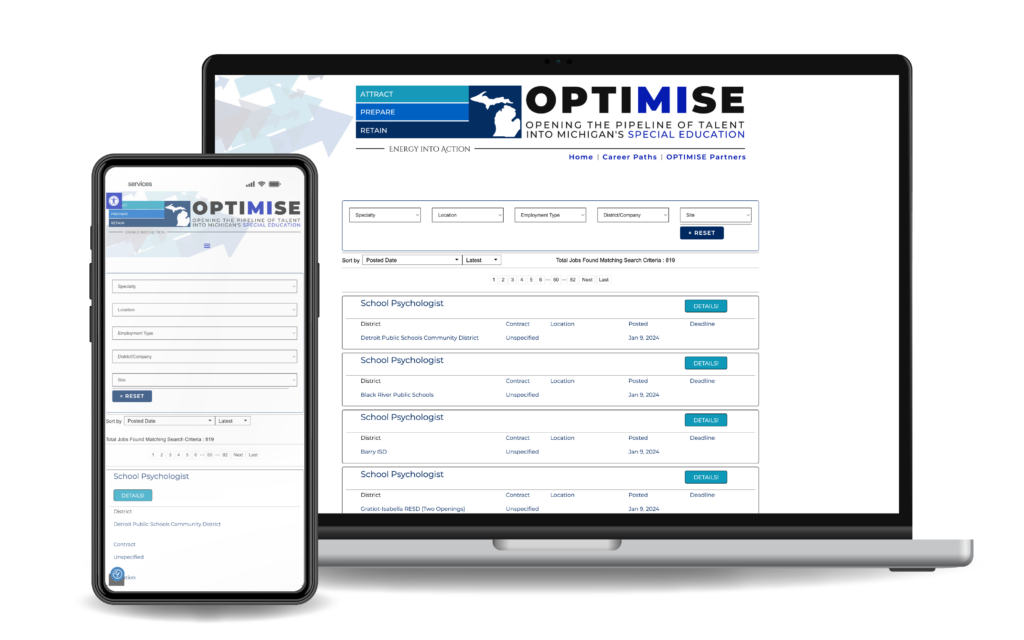Michigan’s School Occupational Therapists
A school-based occupational therapist is a highly specialized professional who works within an educational setting to support students’ development and success. Their primary role is to assess and address the unique needs of students who may face physical, sensory, cognitive, or emotional challenges that impact their ability to participate effectively in academics, play and leisure, social participation, self-care skills (ADLs or activities of daily living), and transition/ work skills.
School-based occupational therapists collaborate with teachers, parents, and other professionals to create individualized plans and interventions aimed at improving students’ fine motor skills, sensory processing, attention, and overall independence. By providing tailored support, they help students overcome barriers and achieve their educational goals, ultimately promoting inclusion and enhancing the overall learning experience in schools.
Alpena-Montmorency-Alcona ESD

Start Your Michigan Occupational Therapist Journey
To join this amazing group of occupational therapists you need:
Step 1: Earn a bachelor’s degree in any of the following areas:
- Biology.
- Psychology.
- Kinesiology.
- Health Sciences.
Step 2: Earn a Master’s Degree in Occupational Therapy (MOT).
- Apply to an accredited Master of Occupational Therapy (MOT) program.
Step 3: Fieldwork
- Occupational therapy programs include 6 months of supervised fieldwork, where you will get to work hands-on, working with patients in different settings.
Step 4: Licensure
- Take and pass the National Board for Certification in Occupational Therapy (NBCOT).
- After passing the NBCOT, apply for licensure in Michigan through the Michigan Board of Occupational Therapy.
Note: Regardless of your major, you will need to complete specific prerequisite courses to apply for Occupational Therapy graduate programs, including biology, anatomy, physiology, psychology, sociology, and statistics.
Volunteer to Gain More Experience!
Get hands-on experience and find a classroom near you that is in need of a volunteer!
Job Shadow an Occupational Therapist
To participate in a job shadow, reach out to a school district and request to job shadow a Occupational Therapist for a day.
Each school district has their own policy when it comes to job shadowing, but you may need a state ID or a driver’s license to participate.
College Program Information
Click a point on the map to find degree programs, scholarships, grants, and organizations to join!
Certifications/Licensing
It is required to serve at least 6 months in an occupational therapy clinic under the direct supervision of a licensed occupational therapist before you can recieve your OT license.
Must score in at least the 70th percentile.
- Submit a signed and completed application.
- Provide a check or money order for $90 license fee.
- Request transcripts from all attended colleges or universities.
- Forward score reports from your NBCOT exams.
- Request verification of licensure from past states in which you have practiced.
- Submit fingerprints for a criminal background check.
Michigan Occupational Therapist Educational Funding
Free College Opportunities
Allows students to earn college credit (up to 10 courses) while in high school at no cost between 9th-12th grade. The classes that students are eligible for must not be offered by the high school or PSA and must lead towards postsecondary credit, accreditation, certification, and/or licensing.
How to apply – Students are to talk with their high school advisor on eligibility, application, deadlines, and college course options.
A Michigan Department of Education approved five-year program of study.
EMCs work closely with certain colleges to provide students with an opportunity earn a high school diploma and one or more of the following:
- 60 transferable college credits.
- An associate degree.
- A professional certification.
- The Michigan Early Middle College Association (MEMCA) technical certificate.
- Participation in a registered apprenticeship.
The Michigan Achievement Scholarship is designed to help students pursue their dreams, goals, and aspirations in the Mitten State! Graduating high school seniors are eligible to earn a skill certificate or degree at their local community college tuition-free just by filling out the new and simplified FAFSA.
State Scholarships & Grants
Michigan Reconnect is a scholarship program that pays you to attend your in-district community college tuition free or pays up to the in-district rate if you attend a community college where you’re considered out-of-district. Applicants must be 25 years old to apply.
Thirteen Promise Zones have already begun awarding scholarships. Educators, businesses, families and civic leaders are also striving to embed a pervasive culture of learning in these communities – an essential ingredient in any recipe for education success.
Amount: $2,000 – $5,500
Federal Scholarships & Grants
Colleges and career schools use the FAFSA form to determine how much financial aid you’re eligible to receive, which could include grants, scholarships, work-study funds, and loans.You must apply for aid every year.
The Federal Student Aid Estimator provides an estimate of how much federal student aid the student may be eligible to receive. These estimates are based on the Student Aid Index (SAI), an index to determine federal student aid eligibility.
Direct Subsidized Loans and Direct Unsubsidized Loans are federal student loans offered by the U.S. Department of Education (ED) to help eligible students cover the cost of higher education at a four-year college or university, community college, or trade, career, or technical school.
A federal grant for undergraduate students with financial need.
If you’re employed by a government or not-for-profit organization, you might be eligible for the PSLF Program. The PSLF Program forgives the remaining balance on your Direct Loans
Direct PLUS loans can help pay for education expenses not covered by other financial aid. The U.S. Department of Education makes Direct PLUS Loans to eligible graduate or professional students through schools participating in the Direct Loan Program.
Grant for undergraduate students with exceptional financial need, administered directly by financial aid office at each participating school, not all schools participate
part-time employment while enrolled in school, available to undergrad, grad, and professional students with financial need, available to full and part-time students, administered by participating schools, emphasizes employment in civic education and work related to course of study or civic education, on or off campus
Occupational Therapist Story Tellers
Below are videos highlighting Occupational Therapists throughout Michigan.
Find out why they love the profession.


